
19 minute read
Engage
Everyone has a stake in a secure energy and environmental future. That is why at the Andlinger Center for Energy and the Environment at Princeton University, we bring together companies, government entities, nonprofits, and other key stakeholders to discuss how to meet the world’s energy and environmental needs. Through conferences, workshops, and seminars, we facilitate dialogue and amplify the ideas and technologies that will help build inclusive, diversified, and thoughtful solutions. Our corporate partnership program, Princeton E-ffiliates Partnership, and our external engagements across sectors, enable us to expand our reach and ensure that research outcomes are pragmatic, collaborative, and designed for the field. Partnerships help us go further, and bring a diversified lens to academic research. Whether we are studying pathways to an energy transition, cutting the carbon footprint of chemical processes, developing new materials for solar cells, or capturing and valorizing carbon, we expand the view of our partners, just as they expand ours. Together we answer critical questions and solve problems with new tools.
Barry Rand, associate director for external partnerships at the Andlinger Center for Energy and the Environment and associate professor of electrical engineering and the Andlinger Center for Energy and the Environment (Photo by Tori Repp/ Fotobuddy)
$10.9Million
Cumulative Funding for All Research Projects via Princeton E-ffiliates Partnership
+ $4.7 million + $2.1 million + $1.6 million + $1.4 million
$282,298 + $299,500 + $304,216 + 213,986
2013 2014 2015 2016 2017 2018 2019 2020 80
Faculty, Researchers and Students Impacted
+15
7 +11 +3 +9 +8 +17 +10
2013 2014 2015 2016 2017 2018 2019 2020
52
Collaborations Formed as a Result of E-ffiliates Research
+14
3 +5 +1 +7 +4 +10 +8
2013 2014 2015 2016 2017 2018 2019 2020
Key to Andlinger Center Research Areas
Built environment, transportation, and infrastructure
Electricity production, transmission, and storage
Fuels and chemicals
Environmental sensing and remediation
Decision and behavioral science, policy, and economics
Environmental and climate science
PSEG Undergraduate Poster Award
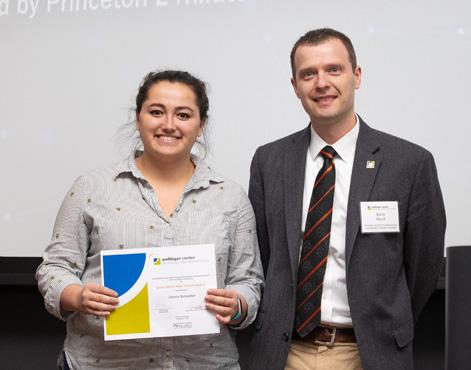
Audrey Shih, Class of 2021 / “Polymer Flow Structures in Porous Media” –Advised by Sujit Datta, assistant professor of chemical and biological engineering
American Tower Graduate Student Poster Award
Liquin Peng / “Underreported Coal In Statistics: A SurveyBased Solid Fuel Consumption and Emission Inventory for the Rural Residential Sector in China” –Advised by Denise Mauzerall, professor of civil and environmental engineering and public and international affairs
ExxonMobil Graduate Student Poster Award
Joanna Schneider / “ColloidEnhanced Mobilization of Immiscible Fluids” –Advised by
Sujit Datta
ExxonMobil Postdoctoral/Researcher Poster Award
Ali Daraeepour / “Enhancing Price Formation Process in Electricity Markets to Support Advancing High Renewable Energy Targets: A PJM Case Study”–Advised by Eric Larson, senior research engineer at the Andlinger Center for Energy and the Environment
On November 8, nearly 300 people convened for the 2019 Annual Meeting, sponsored by Princeton E-ffiliates Partnership (E-ffiliates). Experts from government, academia, and industry presented on a range of topics, including creating new environmentally friendly fuels to sustainably power industries and transforming atmospheric carbon into useful products. Participants explored ways to bring disparate fields together to move toward the goal of drastically reducing atmospheric carbon. Phil Sharp, former U.S. representative and former chair of the House Subcommittee on Energy and Power, and David Eaglesham, an entrepreneur who has founded several energy and technology startups, were the keynote speakers. They advocated for policies that would push down the price of renewable electricity and enable sustainable technologies to scale. Sharp spoke to the importance of a carbon tax and how policy could lower the cost of renewable hydrogen and other clean power sources. Gregory Nemet, professor of public affairs at the University of WisconsinMadison, spoke about applying lessons from the historic cost declines of utility-scale solar power to the newest low-carbon advances. Discussion also tackled the need for incentives to develop a robust carbon management industry so that removing and utilizing carbon from the atmosphere is profitable, conjuring the image of a future which a nascent carbon industry becomes the largest industry in the world by the end of the century.
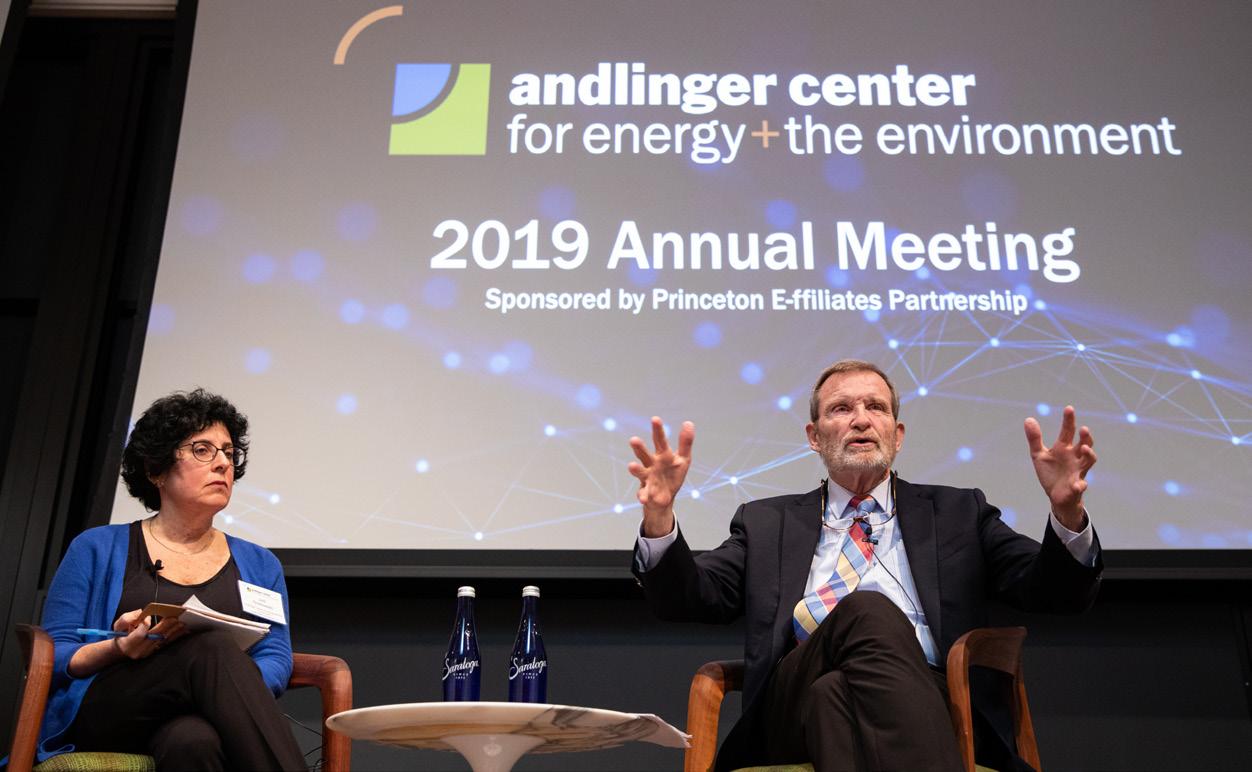
TOP LEFT Joanna Schneider receives the ExxonMobil Graduate Student Poster Award, pictured with Barry Rand at the 2019 annual meeting. ABOVE The Honorable Phil Sharp and Judi Greenwald, a non-resident fellow at the Andlinger Center, lead the keynote discussion about policies to accelerate decarbonization at the 2019 Annual Meeting. RIGHT David Eaglesham, entrepreneur-in- residence at Breakthrough Energy Ventures, speaks on pushing decarbonization efforts beyond the electric sector. (Photos by Tori Repp /Fotobuddy)
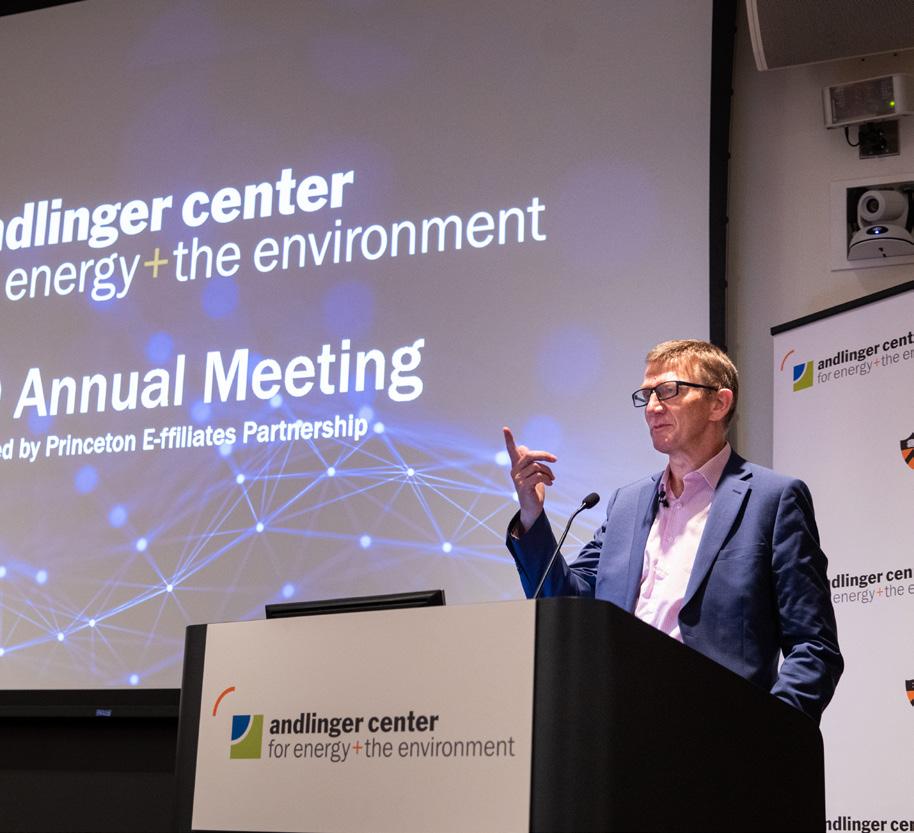
E-ffiliatesFunded Projects Since Inception
17 projects funded
$2.3 million total funds awarded
In discussion with nearly 200 researchers, students, and industry representatives who gathered virtually, resilience experts said making the latest climate science accessible to mayors, planners, and local officials is the only way coasts will be able to prepare for sea level rise and other impacts of climate change. At the 2020 E-ffiliates retreat, led by Richard Moss, Gerhard R. Andlinger Visiting Fellow in Energy and the Environment, panelists, including Alice Hill, a senior fellow for climate change policy at the Council on Foreign Relations, Jainey Bavishi, director of New York City Mayor’s Office of Resiliency, and Skip Stiles, executive director of Wetlands Watch, said that strengthening the resilience of coastal communities, or the ability to rebound from a disturbance, is urgent. Edward Gray, director of transmission and distribution engineering at PSE&G, spoke to the challenge of passing rate increases to harden infrastructure when the value of avoiding future outages is uncertain and difficult to quantify. Haroon Kheshgi, senior scientific advisor at ExxonMobil Corporate Strategic Research, said localized climate and meteorological data and continually incorporating these new data into existing management systems is important to protecting assets and communities from severe effects. The panelists emphasized that this work requires reducing the information gap between the scientific community and practitioners, a divide that E-ffiliates aims to bridge.
E-ffiliates Funds Research
Research seeking to protect the power grid from hackers tapping into armies of smart home appliances, and a novel effort to harvest drinking water from the air, have been selected for funding by E-ffiliates.
Safeguarding the Power Grid: Staving off Rogue Appliances
The idea of an army of air conditioners and water heaters massing to take down the power grid seems unlikely, but it could be a real threat in the future. At the hands of sophisticated hackers, new
Prateek Mittal (Photo by Sameer A. Khan/Fotobuddy)
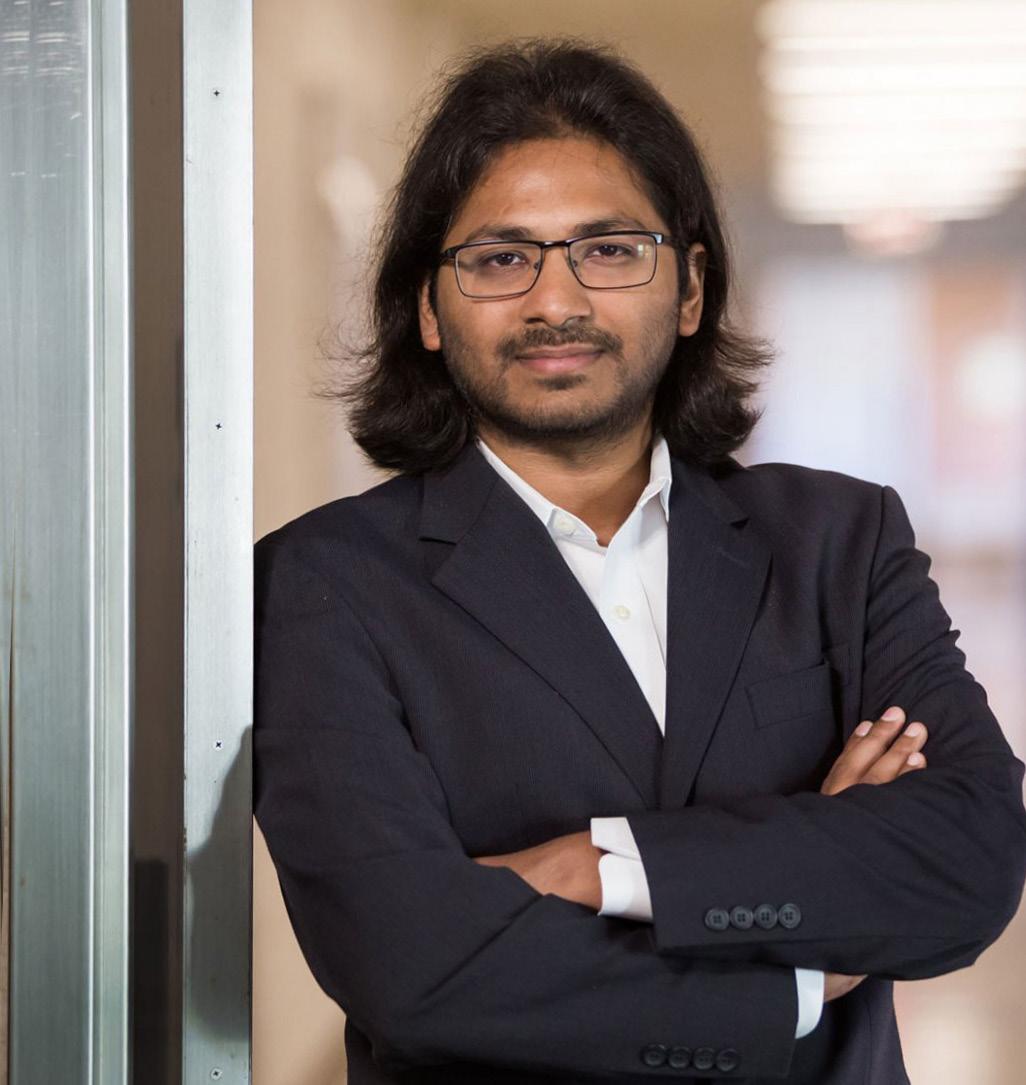
smart appliances, which are all connected to the internet and the grid, could become tools for manipulating power demand on a massive scale. E-ffiliates is supporting research that aims to avoid a future in which these high-wattage devices are vulnerable to unpredictable attacks that shut off or turn on the appliances, which can create large unexpected changes in power demand and cause massive blackouts. The researchers are developing systems and algorithms to inform grid operations on how to minimize the impacts from such breaches and, ultimately, prevent serious disruptions in power delivery.
The project is led by Prateek Mittal, associate professor of electrical engineering, in collaboration with H. Vincent Poor, the Michael Henry Strater University Professor of Electrical Engineering.
Pulling Drinking Water From the Air
Climate change is worsening drought across large swaths of the globe. To combat this, a team of Princeton researchers is looking to an uncommon water source—the air. The team aims to use thermo-responsive hydrogels, or networks of polymers that are commonly used in biomedical applications, for water harvesting. Whether thermo-responsive
BELOW
Community Energy has been developing wind and solar farms for over 20 years, supporting the carbon reduction efforts of companies and municipalities. (Pkawasaki / stock. adobe.com) hydrogels attract or repel water changes with temperature. The team is harnessing this feature to develop a hydrogel that can absorb water from the air in the evening when it is cool, and release the absorbed water when the air warms up during the day beyond a certain threshold. Existing water harvesting technologies typically use desiccants, materials similar to the gels that keep new shoes dry, which require a lot of energy and an external source of heat or electricity to release the captured moisture. In contrast, these hydrogels only require modest temperature swings and a much lower energy cost to expel the absorbed water.
The project is the result of a collaboration between Sujit Datta, assistant professor of chemical and biological engineering, Sankaran Sundaresan, and Forrest Meggers. Sundaresan is the Norman John Sollenberger Professor in Engineering, and professor of chemical and biological engineering, and Meggers is assistant professor of architecture and the Andlinger Center for Energy and the Environment.
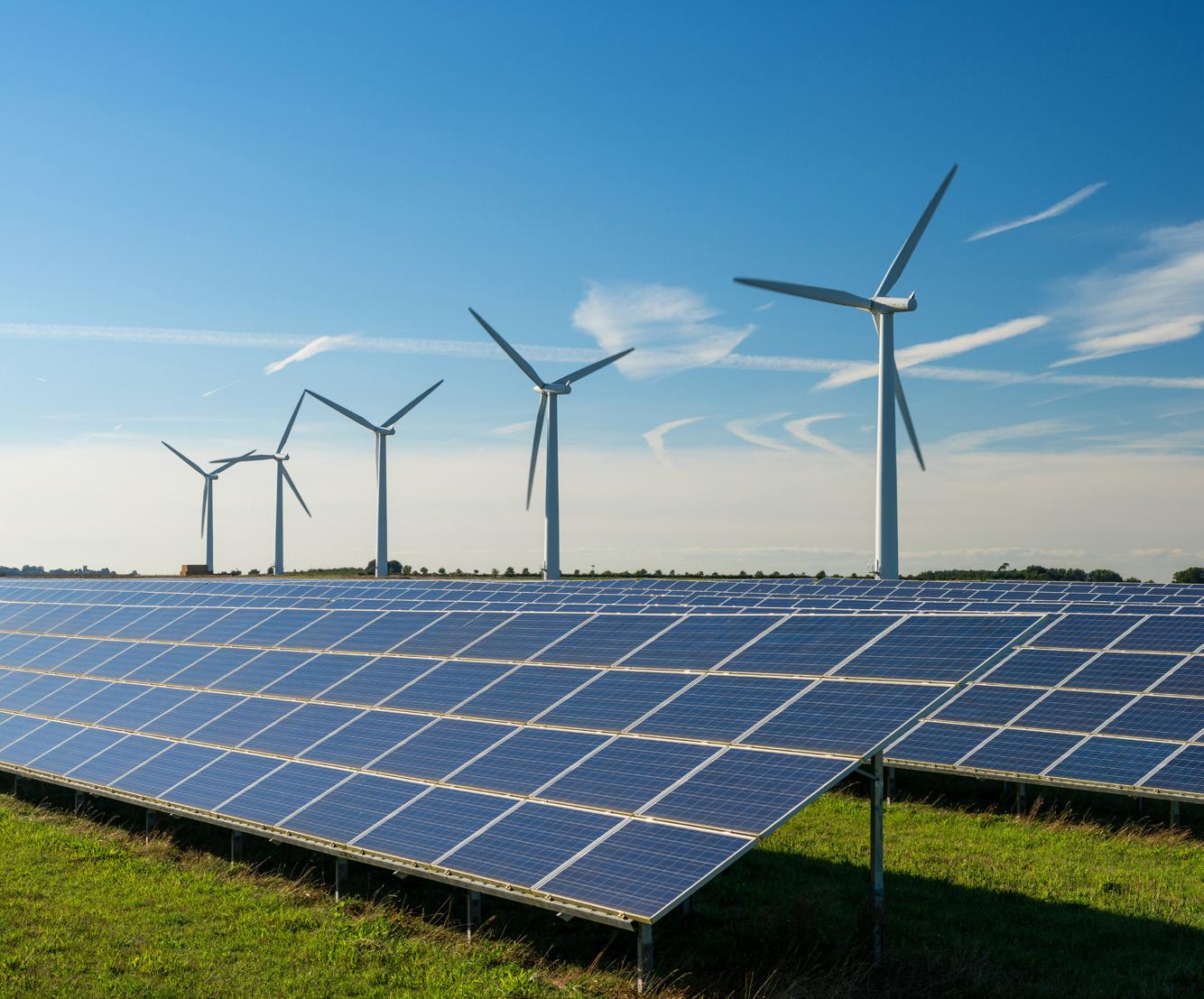
New E-ffiliates Members
Evidn, an applied behavioral science firm, joined E-ffiliates on December 1, 2019. The company specializes in the design, delivery, and evaluation of behavior change programs in the context of complex environmental problems. Evidn is the first company outside of the energy and water sectors to join E-ffiliates. The company, led by co-founder and CEO John Pickering, has worked with the Australian government and multinational companies to tackle problems ranging from water pollution to car accident prevention. The tactics involve using the latest behavioral science to design interventions and educational campaigns to facilitate behavior change. The opportunities for impact through the partnership range from reducing peak and average residential energy use to increasing climate awareness in investment decision-making.
Community Energy, a national renewable energy developer, joined Princeton E-ffiliates Partnership as of July 1, 2020. The company, which has built solar and wind farms from New Jersey to Colorado, is a leader in clean power development and the first renewable energy developer to join E-ffiliates. Brent Alderfer, co-founder and CEO of Community Energy, said that the Andlinger Center’s research is unique in combining fundamental scientific research and practical questions. Alderfer is particularly interested in research that outlines how a transition of the electric sector could actually play out in an economically feasible way for a particular region and how solar, wind, gas, and nuclear plants may be deployed.
“The Andlinger Center is a perfect bridge between academic and policy studies and utility developers and investors to help make the energy transition happen, and happen in a way that’s economical and environmentally beneficial,” said Alderfer.

Member Updates
Q
Forrest Meggers
completed a project with Siemens Corporate Technology on using thermal sensing to optimize manufacturing.
Q American Water has explored opportunities with Princeton researchers to study emissions from its wastewater treatment plants in hopes of reducing or utilizing waste gases as resources.
Q Other E-ffiliates members that have supported our research and student activities include Power Survey Company and NRG
Energy.
Research Collaborations with ExxonMobil
The Andlinger Center renewed its partnership with ExxonMobil Research and Engineering Company in 2020, extending the collaboration beyond its initial five-year agreement in light of academic successes. Princeton faculty, researchers, and students work with ExxonMobil researchers on a portfolio of collaborative research projects spanning 18 faculty labs across eight departments, including projects on climate science and sustainable energy technologies, two of which are highlighted below.
Satellite Data Paints a Clearer Picture of Air Quality
Ammonia is the most abundant alkaline gas in the atmosphere and a precursor to haze, which impacts human health. A main source of ammonia is agriculture. Now researchers led by Mark Zondlo, associate professor of civil and environmental engineering, are using satellites to measure atmospheric ammonia from space and have created high-resolution maps of the gas over India. Prior to this work, global models applied assumptions about ammonia emissions, attributing the seasonal emission peaks in ammonia to Europe’s agricultural industry. Using machine learning clustering techniques, the researchers found significant spatial and temporal variability in ammonia over India, which is different from what had been assumed in the global models. The ammonia emissions in India depend on the growing seasons and prevalence of crops like wheat and rice, which require ammonia- based fertilizers. This study represents a novel use of spatiotemporal information from satellites to inform pollutant emissions used in global models that simulate air pollutant formation, transport, and climate interactions. The sensing and data analytic techniques developed for the project can be used to study other pollutants of interest, emitted from various sectors, anywhere in the world. Zondlo works with Cynthia Randles of ExxonMobil Research and Engineering Company on the research.
The Wide World of Superconducting Graphene
In spring 2018, the surprising discovery of superconductivity in a new material set the scientific community abuzz. Built by layering one carbon sheet atop another and twisting the top one at a “magic”
RIGHT
A layer of one carbon sheet is placed atop another and is twisted at a “magic” angle to create a pattern of electrons that lead to superconductivity. (Image designed by Kai Fu for the Yazdani Lab, Princeton University)
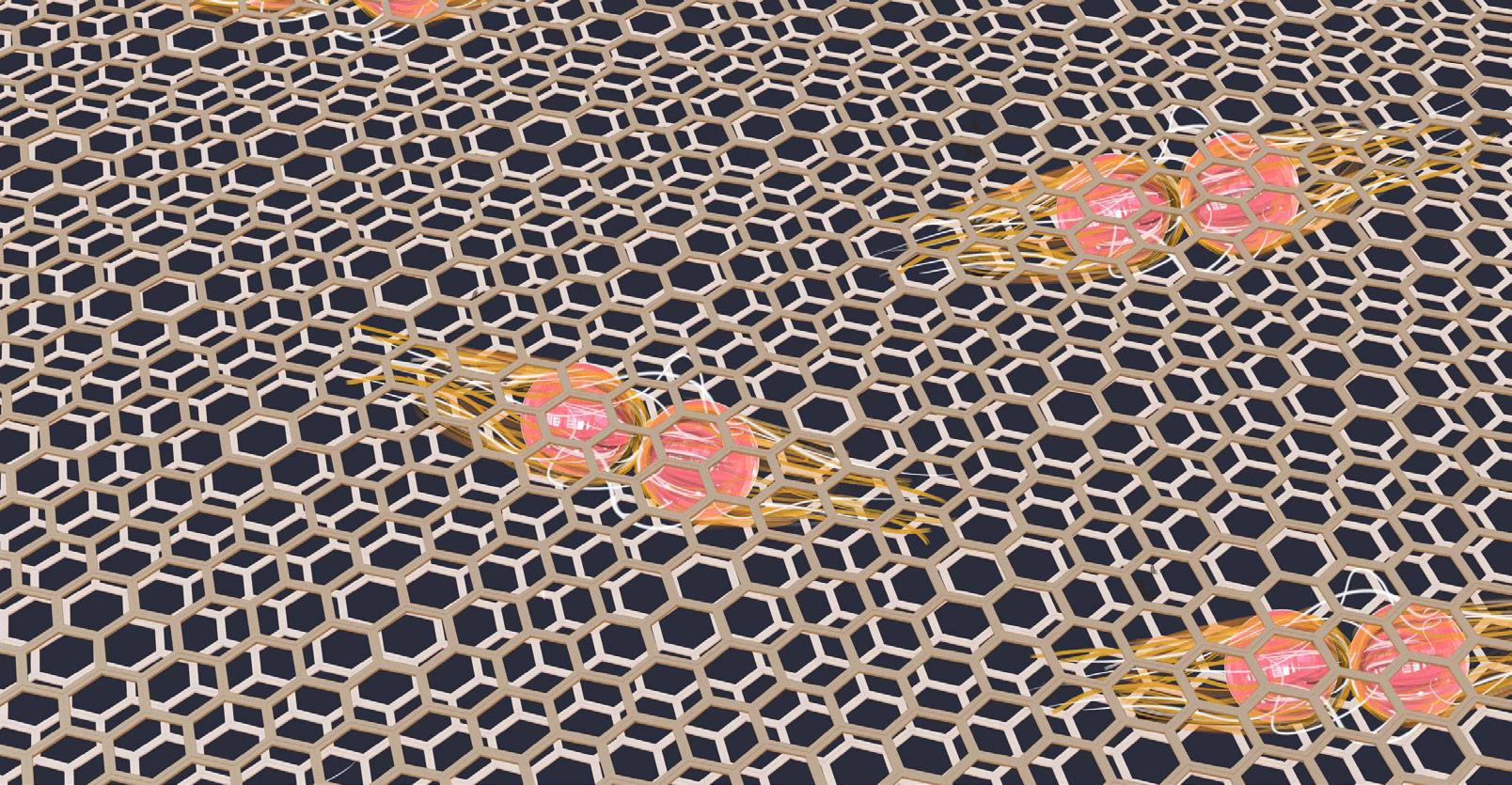
BELOW
Map of the PJM, the regional transmission organization that coordinates the electric market for much of the east coast, named for several states in the electric territory, Pennsylvania, Jersey, and Maryland. angle, the material enabled electrons to flow without resistance, a trait that could dramatically boost energy efficient power transmission and usher in a host of new technologies. Several Princeton experiments had given hints at how this material—known as magicangle twisted graphene—gives rise to superconductivity. Now Princeton researchers have provided firm evidence that the superconducting behavior arises from strong interactions between electrons, yielding insights into the rules that electrons follow when superconductivity emerges. In 2020, Ali Yazdani, the Class of 1909 Professor of Physics and director of Princeton Center for Complex Materials, and a team of researchers directly measured the strength of the interactions between the electrons, and found that they bunch together in interesting patterns and respond readily to an applied voltage. The research has found that in these unique materials, the electron’s behavior can change simply by adjusting the bias voltage, effectively an easy switch. This can enable the material to go from superconducting to insulating, opening the door for many new applications. The material could be used to build a new kind of transistor for electronics, or could create a low-energy way to separate gases from the air or separate power plant exhaust gases. Yazdani works with Yunlong Zhang of ExxonMobil Research and Engineering Company on the research.
Research Collaborations with PSEG: Decarbonization Scenarios for PJM
Princeton researchers and PSEG are working to assess the future carbon emissions from electricity generation across the PJM electricity grid, which extends from the mid-Atlantic region past Ohio. The research will investigate the costs of electricity for New Jersey customers under various decarbonization scenarios and how changes to state, regional, and national policies and markets, as well as uncertain changes in technology cost and availability, might impact the emissions of and costs of electricity. Researchers, led by Jesse Jenkins, assistant professor of mechanical and aerospace engineering and the Andlinger Center for Energy and the Environment, use a nationwide data set of available wind and solar development areas and associated time series profiles, as well as time series profiles for changes in demand due to electrification of transportation, heating, and other end uses, to create customized electrification scenarios. The researchers explore the potential impacts of more electric vehicles on the road, electric heat pumps installed, and the extension of the nuclear fleet, among other variables. Eric Larson, senior research engineer at the Andlinger Center and head of the Energy Systems Analysis Group, is also collaborating on the research.
Research Collaborations with American Tower: Designing for Big Data, Efficiency, and Privacy
Web services, financial markets, and hospitals are just a couple of industries that are continuously generating an enormous amount of data that needs to be processed and stored. As a digital transformation sweeps across society and the global economy, computing infrastructure needs to be developed closer to the user with faster data transfer rates and improved data security. Minjie Chen, assistant professor of electrical engineering and the Andlinger Center for Energy and the Environment, is developing general purpose energy processing units (EPUs) that can precisely and efficiently manage power demand from emerging technologies and growing sectors, such as data centers, telecom infrastructure, solar farms, and grid-scale energy storage systems. With support from American Tower Corporation, an international owner and operator of wireless and broadcast communications infrastructure, Chen is testing how the units can be integrated with solar panels and battery banks, in an effort to create a self-powered small-scale server for computing at the grid edge. The EPUs are energy efficient and built for resiliency and security as they are highly modular, allowing easy installation, maintenance, and relocation. The project aims to demonstrate a next-generation power delivery architecture for smallscale base stations at the edge.
RIGHT
Harry Warren closes the Energy Dialogues meeting (left) and Richard Moss presents his research on climate adaptation strategies in the Andlinger Center courtyard. (Photos by Bumper DeJesus)
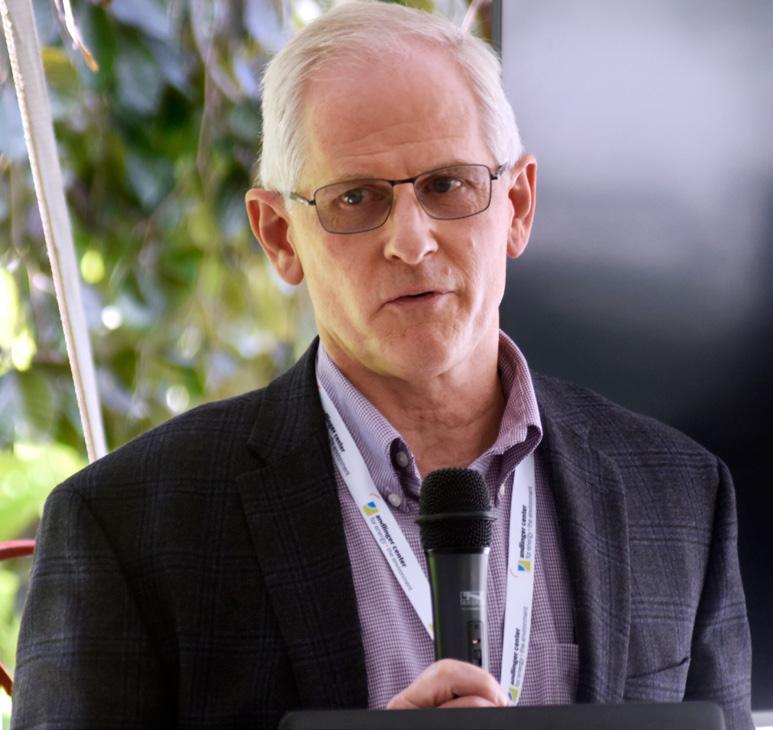
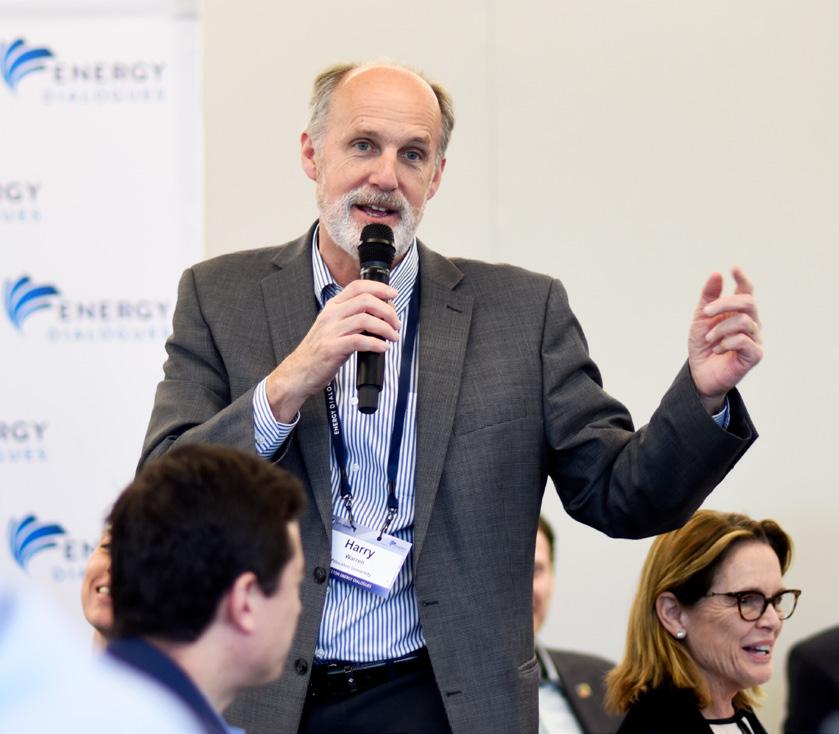
—Richard Moss
During his time as a visiting fellow, Harry Warren, a 1979 alumnus, curated a full-day conference aimed at facilitating conversation between diverse players within the energy industry, from renewable energy developers to utility regulators, in collaboration with Energy Dialogues LLC. The event covered regional and global topics in the changing energy landscape: transitioning New Jersey and the broader PJM grid to a carbon-neutral electricity supply; achieving largescale carbon sequestration in the U.S. and globally; and how corporate environmental, social and governance programs and reporting are affecting the carbon footprints of corporations. The conference welcomed nearly 60 participants, and was led by Princeton faculty, senior research staff, and visiting fellows who moderated panels and roundtable discussions. Undergraduate and graduate students participated in the discussion, met leaders in the field, and were able to ask pressing questions. Corporate representatives working on energy and the environment had access to academic experts to discuss research gaps and learn from one another in a neutral setting for idea exchange. In addition to organizing the conference, Warren guest lectured on renewable energy economics in three graduate and undergraduate classes and advised students on career opportunities in energy, which he continues to do as a non-resident fellow. Richard Moss, a 1987 graduate alumnus, directed the programming behind the 2020 E-ffiliates retreat, which focused on resilience and making infrastructure and communities resilient to storms and other extreme disruptions. One theme of the event was evaluating vulnerability and connecting scientists with practitioners to increase resilience. Moss will continue to develop meetings and resources to facilitate this engagement between previously unconnected stakeholders. He also collaborated with Elke Weber and colleagues on research about how to make reports, like those for the International Panel on Climate Change, more impactful, useful and accessible for broad swaths of the population. All of this work aligns with the mission of SCAN, the Science for Climate Action Network, a nonprofit network dedicated to accelerating climate change action by standardizing how climate science is applied in decision-making and providing resources for those on the front lines of climate change mitigation and adaption work. For more information on the E-ffiliates retreat, refer to page 22. Weber is the Gerhard R. Andlinger Professor in Energy and the Environment and a professor of psychology and public affairs. Moss continues to participate with the center as a non-resident fellow.
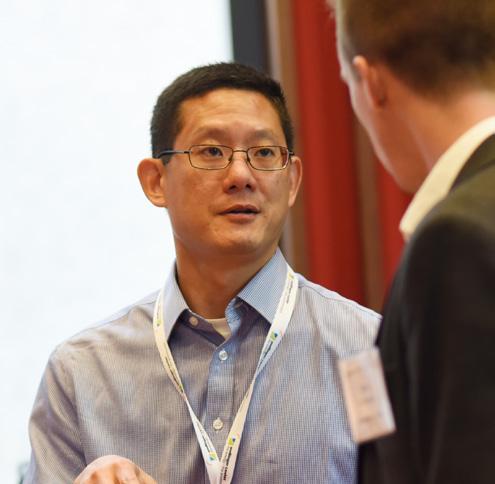
ABOVE
Anthony Ku discusses opportunities to significantly decarbonize the Chinese power sector. (Photo by Bumper DeJesus)
Fellows Around the World
Due to the COVID-19 pandemic, for the 2020-2021 academic year the Andlinger Center will offer off-campus collaboration through a non-resident fellows program.
Jeffrey Bielicki, associate professor in the Department of Civil, Environmental, and Geodetic Engineering and in the John Glenn College of Public Affairs at The Ohio State University, is continuing his research on sedimentary basin geothermal heat extraction using geologically-stored carbon dioxide to produce renewable energy. He is working with Forrest Meggers to extend geothermal research at Princeton in part using the University’s geothermal conversion campus project as a living laboratory and research opportunity. He will also collaborate on the Net-Zero America Project with Eric Larson.
Steven Freilich is executive director of Freilich Innovation Consultants. As a non-resident fellow, Freilich lends his industrial experience in the chemical industry to Princeton E-ffiliates Partnership, strengthening offerings and identifying opportunities to connect companies and researchers who share interests, specifically in industrial decarbonization, the electric grid and cybersecurity, and environmental resilience. Throughout his career, Freilich held several positions at DuPont, including most recently Director of Materials Science. He also currently serves as Executive-in-Residence at the Joint Institute for Strategic Energy Analysis at NREL.
Anthony Ku, chief technology officer for NICE America (China Energy Group), is focused on exploring pathways to decarbonize the Chinese power sector, specifically studying how to equitably and economically re-balance a coal-heavy electricity generation portfolio, in support of China's pledge to reach peak carbon by 2030 and carbon neutrality by 2060. Ku is working with Chris Greig, Jesse Jenkins, and Eric Larson as part of the Rapid Switch project.
John Pickering of Australian behavioral science firm, Evidn, is researching the science behind climate action or inaction on the individual and governmental levels. As a non-resident fellow, he worked with Chris Greig and Elke Weber on research in psychology and decision-making science in the context of energy transitions and environmental issues at large.
Former visiting fellows Judi Greenwald, a 1982 alumna, and Darren Hammell, a 2001 alumnus, continued to engage with the center through non-resident fellowships. Greenwald collaborated with Rebecca Ciez on research on national fuel economy standards that showed how the policy achieved environmental and economic goals, detailed further on page 16. Hammell is advising startups and continues to teach his high-demand entrepreneurship course.
Convening Stakeholders
The Andlinger Center held several events over the last year to bring decision-makers together with faculty who inform on energy and environmental issues. Select highlights are listed below:
Meeting: 2019 Andlinger Center Annual Meeting Sponsored by E-ffiliates
November 8, 2019
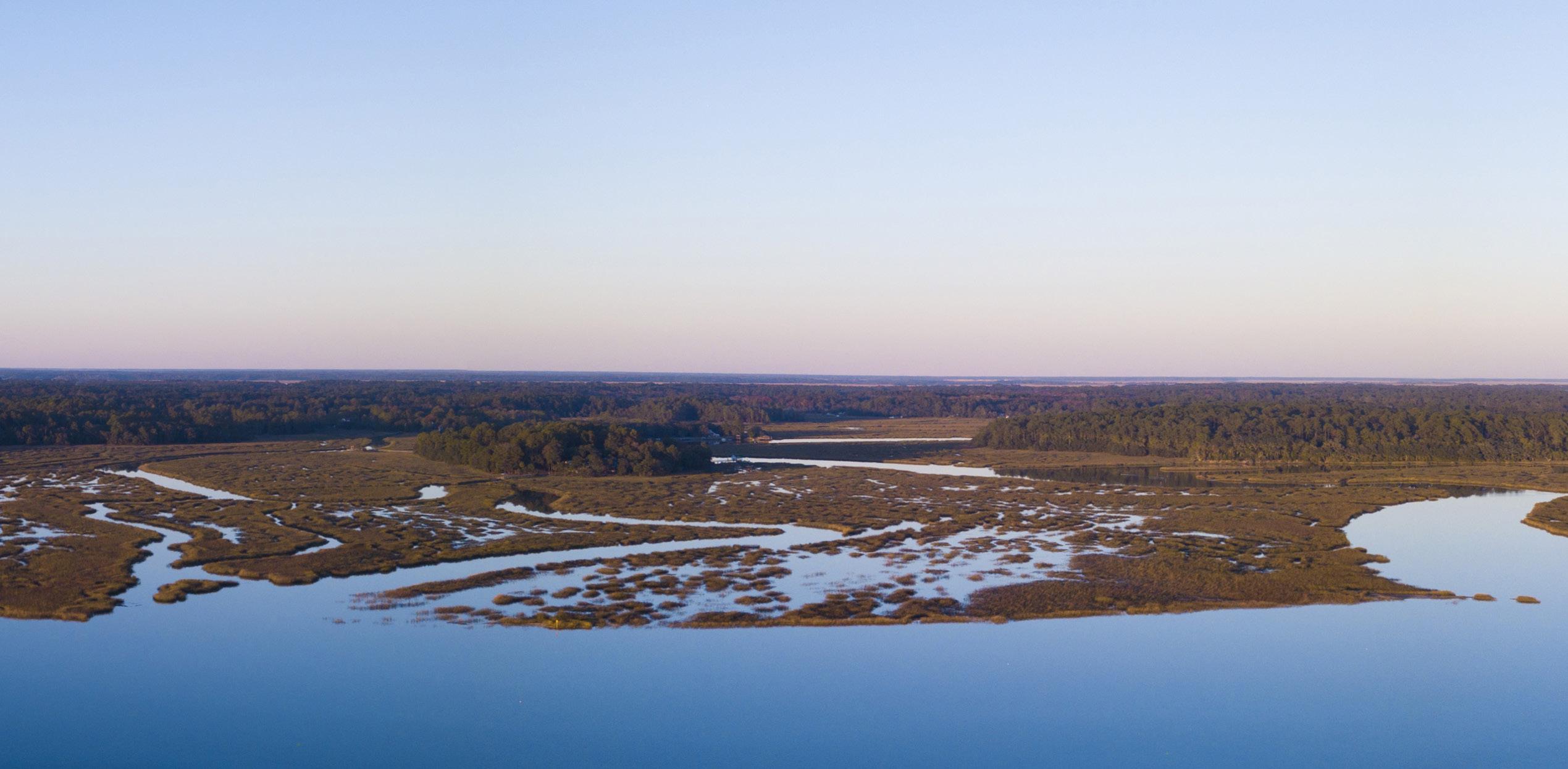
Workshop: The Political Economy of Deep Decarbonization
November 14-16, 2019
Meeting: New Jersey Board of Public Utilities (BPU)
January 30, 2020
Conference: Princeton Energy Dialogues City Series
February 18, 2020
Presentation: Princeton Research on Carbon Capture and Storage with ExxonMobil Research and Engineering Company
February 19, 2020
Conference: Princeton E-ffiliates Partnership 2020 Retreat “Resilience: Coasts and Beyond”
June 9, 2020
Meeting: New Jersey Board of Public Utilities
July 31, 2020
Students tour the Public Service Enterprise Group (PSEG) combined-cycle power plant in Sewaren, New Jersey, as part of the thermodynamics course taught by Lamyaa El-Gabry (second from left), a lecturer in mechanical and aerospace engineering. (Photo by Tori Repp /Fotobuddy)




